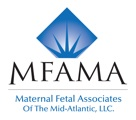Our Services
Non-Invasive Prenatal Testing
In recent years, the term Non-Invasive Prenatal Testing (NIPT) has been applied to the use of circulating cell free DNA (cfDNA) that is present in the blood of expecting mothers. This DNA is derived from the placenta and can be used to screen for major chromosomal abnormalities with a high degree of accuracy such as for Down syndrome (trisomy 21) as well as trisomy 18 and 13. The accuracy of cfDNA is best for Down syndrome and less for trisomy 13 and sex chromosome abnormalities. The test is commercially available through several companies with almost the same degree of accuracy for Down syndrome and trisomy 18 and 13. Some of the companies performing the test have expanded the chromosomes that they test for, however the accuracy of this testing is unknown for the rare disorders such as microdeletions.
Screening Accuracy:
The accuracy of cfDNA screening depends on several factors. The most important is the woman’s baseline risk of carrying a fetus with Down syndrome. The risk of carrying a fetus with Down syndrome or any trisomy increases with age at conception. CfDNA is most accurate in women over the age of 35 who have a higher baseline risk. Younger women with a lower background risk, have a higher chance of a false-positive test, in which a test result may incorrectly indicate a high risk of Down syndrome or trisomy.
CfDNA Positive/Abnormal Result:
A positive result means that that there is a higher chance of a chromosome problem and by no means is conclusive of having a fetus with Down syndrome or a trisomy. The next step is to see a Maternal-Fetal Medicine specialist for a detailed ultrasound evaluation, genetic counseling, and potentially a diagnostic test such as a CVS or amniocentesis.
Test Limitations of NIPT:
- False positive results in younger women
- No test result, which may happen because there isn’t enough free fetal DNA available for testing. This is usually seen when testing is done too early, prior to 9-10 weeks, as result of being overweight with a high body mass index (BMI), or the presence of abnormal fetal chromosomes. Sometimes there is a problem interpreting the test result in the laboratory and that may lead to no test result.
- Twin pregnancy in general and Twins with one demised fetus (Vanished twin). No information is available on the test accuracy in women who are carrying three or more fetuses
Request an Appointment
We invite you to fill out this form to request an appointment. Our scheduling staff will give you a call within 24 hours. For all urgent needs, please call the office directly.
Submit Your Story
We are compassionate about our patients and want to hear from you. Please share your story by clicking on the link below.
